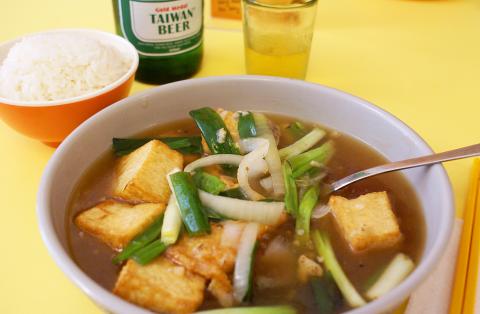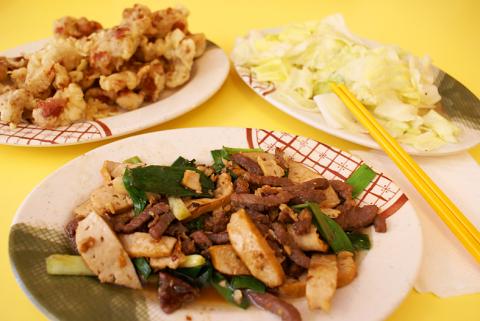“A fresh look on traditional Taiwanese rechao,” reads the Facebook page of Drunken Monkey, a recently opened restaurant five minutes by foot from Guting MRT Station’s (古亭捷運站) Exit 2.
Rechao (熱炒, literally hot-fry) restaurants are a common sight across Taiwan, serving up smallish dishes of everything from deep-fried seafood, stir-fried beef and pork to vegetable and tofu dishes — all of which are typically washed down with copious Taiwan Beer. But perhaps more than anything else, rechao is about community, getting together with friends, family or colleagues and sharing several dishes and a few laughs.
Drunken Monkey’s “fresh” take on rechao is Cantonese fusion.

Photo: Noah Buchan, Taipei Times
Alex Holliday, Drunken Monkey’s talkative proprietor, learned to cook Cantonese-style food from his grandfather, who escaped the ravages of China’s Civil War and ended up in Vancouver, where he opened Capilano Heights Chinese Restaurant 37 years ago. Holliday first came to Taiwan in 2003 to learn Mandarin. He moved here in September of last year and opened the restaurant in November.
Drunken Monkey’s menu includes typical rechao fare — kungpao chicken (NT$100), fried clams with basil (NT$100), deep-fried oysters (NT$120) and deep-fried prawns with pineapple (NT$120) — as well as some “drunken munchies” — Western-style additions such as chicken nuggets (NT$100) and onion rings (NT$100).
I wanted to taste Holliday’s Cantonese favorites, and started off with the combat pork (NT$100), strips of pork dipped in batter, fried until crispy and topped with heaps of chopped garlic. Savory, crispy and garlicky, the robust combination went well with an order of slightly sweet fried cabbage (NT$80).

Photo: Noah Buchan, Taipei Times
The explosive green onion, tofu and beef (NT$100) is a dish also worth ordering, both because of its tasty combination of ingredients as well as its light seasoning. But the green onion and tofu (NT$100) is the standout dish of the items that I tried. Large chunks of lightly seared tofu are drowned in a robust Cantonese-style stew. I’ve tried this dish at other restaurants, many charging double the price for similar sized portions, and this version wins hands down. It went well with a large bottle of Taiwan Gold Label beer (NT$80) and complimentary bowl of white rice.
While many of Drunken Monkey’s dishes offer a new twist on Taiwanese culinary standards, the decor has an old-style and homey rechao feel to it: black-and-white pictures of Capilano Heights Chinese Restaurant, stools and unadorned tables in buttery yellow, walls scribbled with customer comments and framed pictures showing scenes from Chinese mythology. There is even a small table at the front reserved for bottles of whisky, kaoliang and bourbon, which customers can “keep” at the restaurant. But even the interior has some interesting additions: boxing gear (Holliday hung up his muay Thai gloves to open the restaurant) hangs off large posters of monkeys in all manner of martial arts display. A Canadian flag adorns another wall, its maple leaf replaced by a marijuana leaf.
Though Drunken Monkey is no-frills, its inexpensive and tasty fare makes it worth a visit. And if you are like me and want to have at extra few beers on the weekend, Holliday says he’ll stay open until the last “drunken monkey” staggers out of the restaurant.

Dissident artist Ai Weiwei’s (艾未未) famous return to the People’s Republic of China (PRC) has been overshadowed by the astonishing news of the latest arrests of senior military figures for “corruption,” but it is an interesting piece of news in its own right, though more for what Ai does not understand than for what he does. Ai simply lacks the reflective understanding that the loneliness and isolation he imagines are “European” are simply the joys of life as an expat. That goes both ways: “I love Taiwan!” say many still wet-behind-the-ears expats here, not realizing what they love is being an

Google unveiled an artificial intelligence tool Wednesday that its scientists said would help unravel the mysteries of the human genome — and could one day lead to new treatments for diseases. The deep learning model AlphaGenome was hailed by outside researchers as a “breakthrough” that would let scientists study and even simulate the roots of difficult-to-treat genetic diseases. While the first complete map of the human genome in 2003 “gave us the book of life, reading it remained a challenge,” Pushmeet Kohli, vice president of research at Google DeepMind, told journalists. “We have the text,” he said, which is a sequence of

Every now and then, even hardcore hikers like to sleep in, leave the heavy gear at home and just enjoy a relaxed half-day stroll in the mountains: no cold, no steep uphills, no pressure to walk a certain distance in a day. In the winter, the mild climate and lower elevations of the forests in Taiwan’s far south offer a number of easy escapes like this. A prime example is the river above Mudan Reservoir (牡丹水庫): with shallow water, gentle current, abundant wildlife and a complete lack of tourists, this walk is accessible to nearly everyone but still feels quite remote.

It’s a bold filmmaking choice to have a countdown clock on the screen for most of your movie. In the best-case scenario for a movie like Mercy, in which a Los Angeles detective has to prove his innocence to an artificial intelligence judge within said time limit, it heightens the tension. Who hasn’t gotten sweaty palms in, say, a Mission: Impossible movie when the bomb is ticking down and Tom Cruise still hasn’t cleared the building? Why not just extend it for the duration? Perhaps in a better movie it might have worked. Sadly in Mercy, it’s an ever-present reminder of just